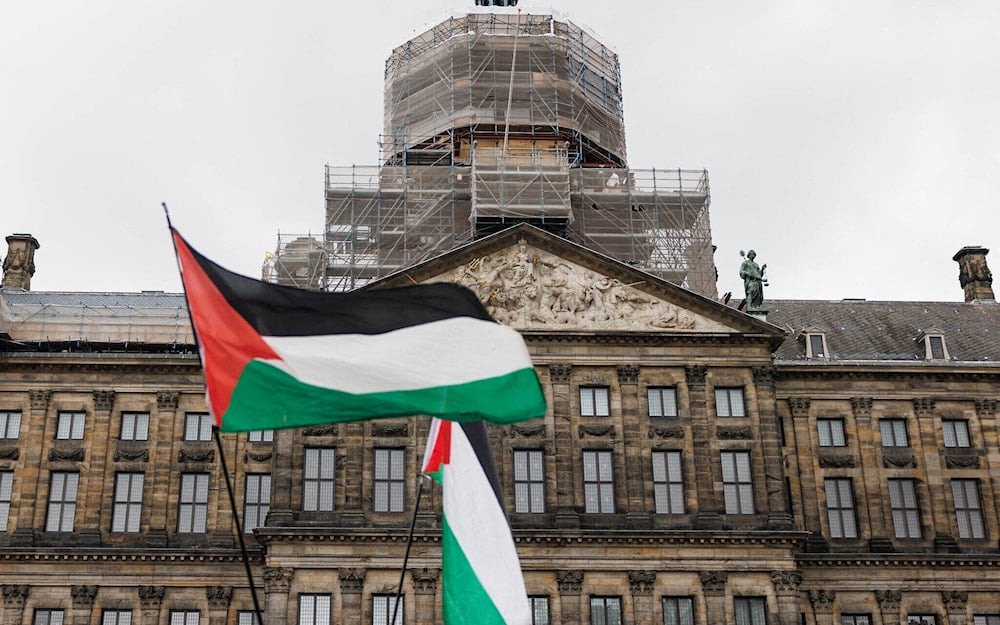Dutch MPs reject recognition of Palestine, measures against 'Israel'
Political turmoil in the Netherlands has overshadowed parliamentary debates, as MPs refused to adopt measures targeting "Israel" or move forward with recognizing Palestine.
-

Palestinian flags flutter in the wind on Dam Square with the Royal Palace of Amsterdam in the background (Paleis op de Dam), in Amsterdam, on November 15, 2024 (AFP)
In a debate marked by political upheaval, Dutch MPs voted down a motion to grant the recognition of Palestine. The proposal, backed by opposition parties, failed to secure majority support, reflecting the government’s reluctance to adopt a stronger stance on the war.
Lawmakers also rejected measures aimed at pressuring "Israel", including a boycott of products from the illegally occupied West Bank, and a ban on the purchase of weapons from "Israel".
Caretaker Defense Minister Ruben Brekelmans argued that halting weapons procurement would undermine Dutch military readiness. He added that a boycott might be considered as part of a broader European Union approach but not unilaterally.
Despite divisions over sanctions, MPs broadly supported a call urging "Israel" to allow international and national journalists access to Gaza, where "Israel" has heavily restricted reporting amid the war.
The chamber also reached consensus on the need for the “total destruction” of Hamas and increasing pressure on states perceived to support the Palestinian Resistance movement.
Read more: Netherlands bars Israeli security firms from NEDS 2025 over Gaza war
Political crisis within the Dutch government
The votes came shortly after the resignation of Foreign Affairs Minister Caspar Veldkamp and all eight ministers from the New Social Contract (NSC) party. Their departure has left the ruling coalition fractured.
With the NSC’s exit, only the VVD (right-wing liberals) and BBB (farmers’ party) remain in the coalition, together holding just 32 of 150 seats in parliament.
Following this step, the Government Information Service (RVD) on Saturday said Dutch King Willem-Alexander accepted the resignations of foreign, interior, education, health, and employment ministers, along with state secretaries.
A statement said Defense Minister Ruben Brekelmans from the VVD will head the Foreign Ministry, while Justice Minister David van Weel will head the Interior Ministry.
Other vacancies were also filled by members from the VVD and BBB parties.
Rump administration
The Netherlands' Prime Minister Dick Schoof now leads what is essentially a rump administration. Schoof said he would seek advice on how to proceed, stressing the difficulty of governing with such a weak parliamentary base.
He reaffirmed Saturday on X that "everybody" is aware of the fact that the "steadily worsening situation" in Gaza is "dramatic".
"We all see the immense suffering and all of us would prefer that the humanitarian situation improve sooner rather than later. However, that recognition did not lead yesterday to a joint conclusion among the three parties. The departure of the NSC ministers makes further reflection on the resulting political situation necessary," he explained.
Schoof also voiced his "deep regret" over ministers' resignation decision, "especially in light of the responsibility the cabinet bears in this caretaker phase."
Upcoming elections in the Netherlands
The Netherlands will hold national elections on October 29, though analysts warn it could take months for a new government to form.
Schoof has already canceled a scheduled trip to Ukraine to deal with the domestic crisis, underscoring the fragile state of the Dutch government as it navigates both internal challenges and international pressure over its stance on Palestine and "Israel."
Read more: Amsterdam lists 'Israel' as foreign threat to national security

 3 Min Read
3 Min Read










